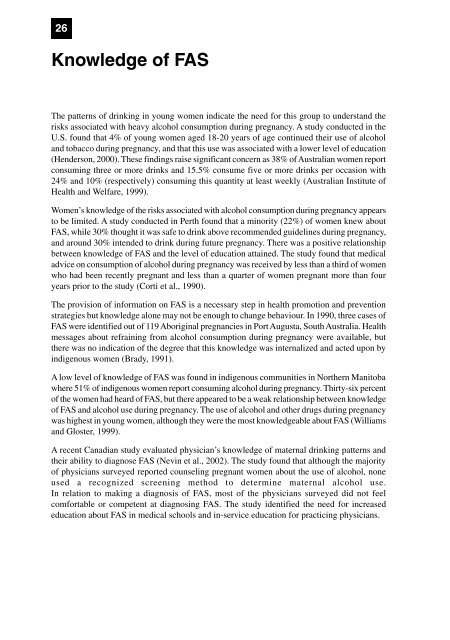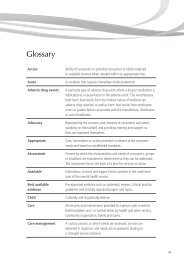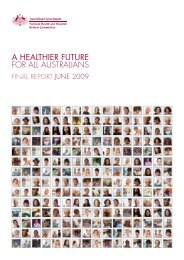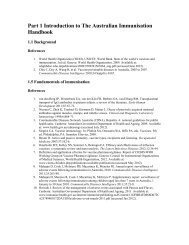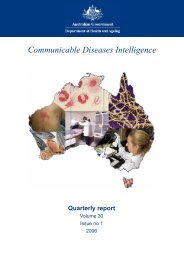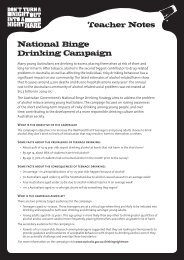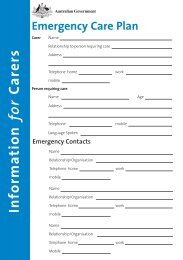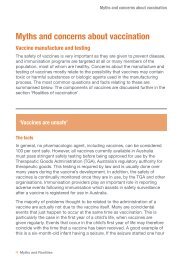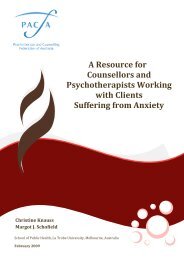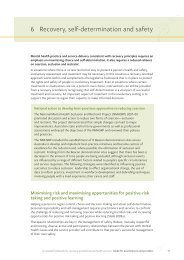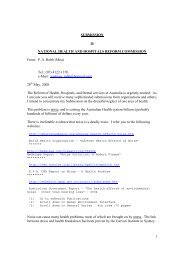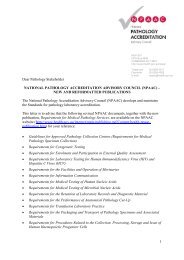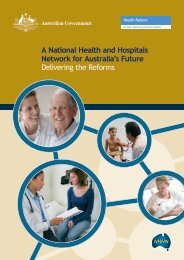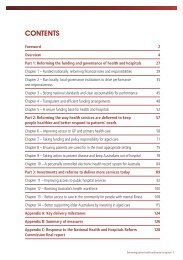Fetal Alcohol Syndrome A literature review - Department of Health ...
Fetal Alcohol Syndrome A literature review - Department of Health ...
Fetal Alcohol Syndrome A literature review - Department of Health ...
You also want an ePaper? Increase the reach of your titles
YUMPU automatically turns print PDFs into web optimized ePapers that Google loves.
26<br />
Knowledge <strong>of</strong> FAS<br />
The patterns <strong>of</strong> drinking in young women indicate the need for this group to understand the<br />
risks associated with heavy alcohol consumption during pregnancy. A study conducted in the<br />
U.S. found that 4% <strong>of</strong> young women aged 18-20 years <strong>of</strong> age continued their use <strong>of</strong> alcohol<br />
and tobacco during pregnancy, and that this use was associated with a lower level <strong>of</strong> education<br />
(Henderson, 2000). These findings raise significant concern as 38% <strong>of</strong> Australian women report<br />
consuming three or more drinks and 15.5% consume five or more drinks per occasion with<br />
24% and 10% (respectively) consuming this quantity at least weekly (Australian Institute <strong>of</strong><br />
<strong>Health</strong> and Welfare, 1999).<br />
Women’s knowledge <strong>of</strong> the risks associated with alcohol consumption during pregnancy appears<br />
to be limited. A study conducted in Perth found that a minority (22%) <strong>of</strong> women knew about<br />
FAS, while 30% thought it was safe to drink above recommended guidelines during pregnancy,<br />
and around 30% intended to drink during future pregnancy. There was a positive relationship<br />
between knowledge <strong>of</strong> FAS and the level <strong>of</strong> education attained. The study found that medical<br />
advice on consumption <strong>of</strong> alcohol during pregnancy was received by less than a third <strong>of</strong> women<br />
who had been recently pregnant and less than a quarter <strong>of</strong> women pregnant more than four<br />
years prior to the study (Corti et al., 1990).<br />
The provision <strong>of</strong> information on FAS is a necessary step in health promotion and prevention<br />
strategies but knowledge alone may not be enough to change behaviour. In 1990, three cases <strong>of</strong><br />
FAS were identified out <strong>of</strong> 119 Aboriginal pregnancies in Port Augusta, South Australia. <strong>Health</strong><br />
messages about refraining from alcohol consumption during pregnancy were available, but<br />
there was no indication <strong>of</strong> the degree that this knowledge was internalized and acted upon by<br />
indigenous women (Brady, 1991).<br />
A low level <strong>of</strong> knowledge <strong>of</strong> FAS was found in indigenous communities in Northern Manitoba<br />
where 51% <strong>of</strong> indigenous women report consuming alcohol during pregnancy. Thirty-six percent<br />
<strong>of</strong> the women had heard <strong>of</strong> FAS, but there appeared to be a weak relationship between knowledge<br />
<strong>of</strong> FAS and alcohol use during pregnancy. The use <strong>of</strong> alcohol and other drugs during pregnancy<br />
was highest in young women, although they were the most knowledgeable about FAS (Williams<br />
and Gloster, 1999).<br />
A recent Canadian study evaluated physician’s knowledge <strong>of</strong> maternal drinking patterns and<br />
their ability to diagnose FAS (Nevin et al., 2002). The study found that although the majority<br />
<strong>of</strong> physicians surveyed reported counseling pregnant women about the use <strong>of</strong> alcohol, none<br />
used a recognized screening method to determine maternal alcohol use.<br />
In relation to making a diagnosis <strong>of</strong> FAS, most <strong>of</strong> the physicians surveyed did not feel<br />
comfortable or competent at diagnosing FAS. The study identified the need for increased<br />
education about FAS in medical schools and in-service education for practicing physicians.


